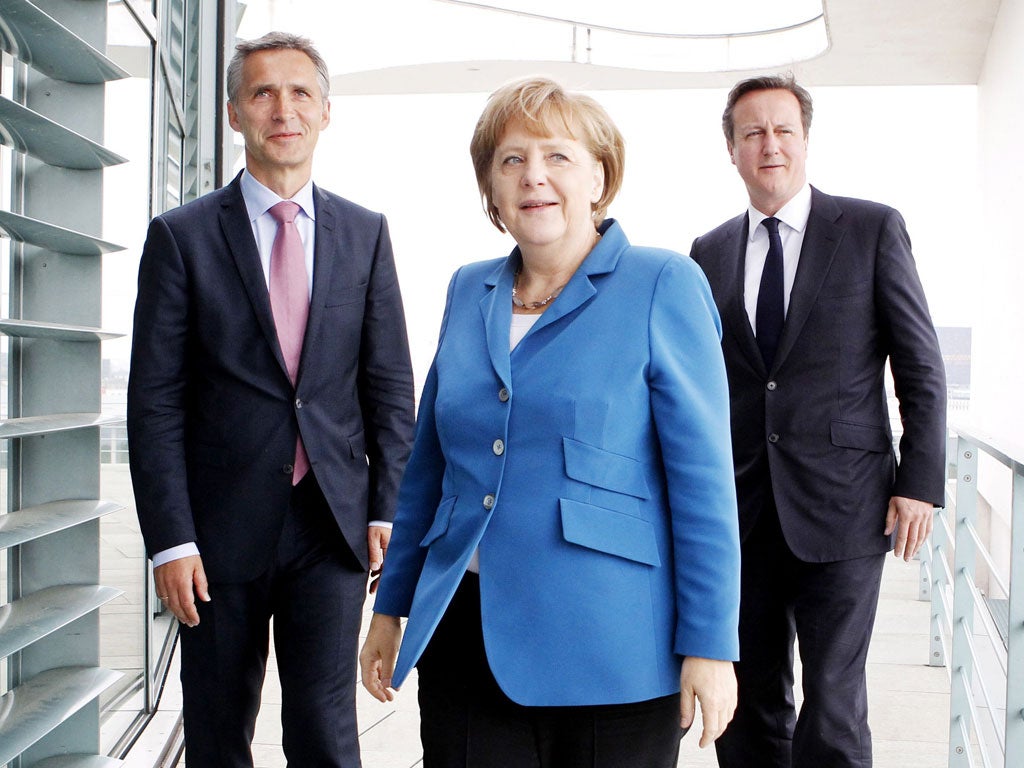Adrian Hamilton: Our policy towards Europe? Do we have one?
World View

As David Cameron, attends yet another EU summit telling everyone else what their policy should be, perhaps this is the time that someone retorts, "Fine, but what are you offering?" Good question. Just what is our policy now towards Europe? The answer is that we have none.
Think of it. We are in the midst of a crisis affecting our most important trading partners and nearest allies. The Prime Minister and his Chancellor believe, and keep telling us, that our future depends on a resolution of the euro's future. The City of London is deeply worried as we seem to be becoming progressively isolated from the Continent. Our manufacturers, those who are left, say they cannot invest because they cannot forecast the market. The Governor of the Bank of England, charged with the health of the financial sector, throws up his arms in despair because he says he cannot tell what is going to happen.
Worse, through casualness as much as deliberate policy, we now find ourselves without allies or even sympathisers in Europe. Mr Cameron has managed to put the German Chancellor, Angela Merkel, against him for leaving the centre right grouping in the European Parliament and proving so unhelpful on her treasured Fiscal Pact. He has offended the new French President by snubbing him when he came to London on his election campaign, put off the Latin countries by dismissing them as spendthrift and disenchanted the new members from Eastern and Central Europe by taking no interest in them.
At a personal level he has no friends. At a political level he has no supporters. And to cap it all, there is a Labour Opposition terrified of sticking its head above the parapet with an alternative policy because, just like the Government, it lives in fear of opinion polls showing a deep public distrust of Europe, while the Conservatives' coalition allies, the Lib Dems, seem equally nervous of making this, their most fundamental commitment, into a policy priority. It's no good telling Europe to get its act together while we not only haven't got ours together, but don't even seem to have an idea of which act we should be playing.
That is our disgrace. Our good fortune is that the eurozone members have just managed to totter on without falling apart. We may berate them for irresolution, but we can be thankful that they haven't managed to come up with a decisive plan which would almost certainly leave us isolated and most likely would contain much that was inimical to our interests.
The latest summit won't be the moment this happens. But it may well be the moment it starts to happen. The duty of any British government, europhile or eurosceptic, is to work out the direction of European policy-making and see how we can best further our own interests in the evolving situation. We have no cards. Cameron has seen to that. But we do have opportunities.
One is in the field of banking integration. In the face of determined opposition from Germany to any mutualisation of sovereign debt, the area of common deposit guarantees and direct purchase of bank debt is being seen more and more as the best route towards a more immediate solution to the eurozone crisis. The British government has so far set its face against joining any such common banking regulation and support. But, interestingly, the City of London seems far less worried by the objections which stopped the government joining Ms Merkel's fiscal pact.
Given the scandals of Barclays and the technical chaos of RBS, we are in no position to lecture the rest of Europe on the virtues of Anglo-Saxon finance. But, equally well, the popular hatred of the banks would make it far easier for London to join in a Europe-wide endeavour of tighter regulation, and even a banking levy. The City of London needs the eurozone as the backyard to its front as a global centre. Now is its chance to show what it has to offer in return.
At the same time, Britain could also play a role in the gathering debate between France and Germany on political as well as fiscal integration. France may be centrist, but it loves not Brussels. Germany may be federalist, but it arouses too many latent fears amongst its neighbours (a factor only exacerbated by Chancellor Merkel's total lack of sensitivity in dealing with fellow eurozone members) ever to be able to push a federalist solution on others.
Mr Cameron keeps promoting the idea of closer integration as the answer to the eurozone's woes, but all Britain's interests must be in the development of a looser confederal Europe. President Hollande's election gives us the chance of promoting it.
Last but not least is the question of democratic accountability. The trouble with Germany's push for integration is that it lacks it. The UK, for all its apparent willingness to tear up the constitution to create a Second Chamber without a referendum, does stand for democratic scrutiny and legitimacy. On that we have plenty of potential allies, from Northern Europe as much as South. All we need to do is to show that we care and get in there and take part.

Join our commenting forum
Join thought-provoking conversations, follow other Independent readers and see their replies